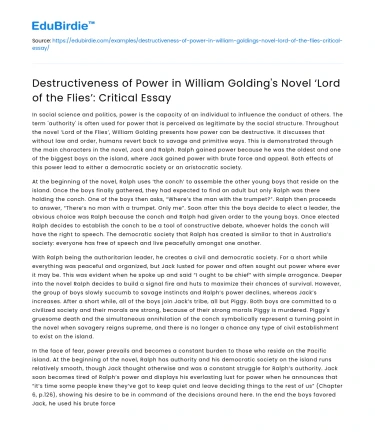In social science and politics, power is the capacity of an individual to influence the conduct of others. The term 'authority' is often used for power that is perceived as legitimate by the social structure. Throughout the novel ‘Lord of the Flies’, William Golding presents how power can be destructive. It discusses that without law and order, humans revert back to savage and primitive ways. This is demonstrated through the main characters in the novel, Jack and Ralph. Ralph gained power because he was the oldest and one of the biggest boys on the island, where Jack gained power with brute force and appeal. Both effects of this power lead to either a democratic society or an aristocratic society.
At the beginning of the novel, Ralph uses ‘the conch’ to assemble the other young boys that reside on the island. Once the boys finally gathered, they had expected to find an adult but only Ralph was there holding the conch. One of the boys then asks, “Where’s the man with the trumpet?”. Ralph then proceeds to answer, “There’s no man with a trumpet. Only me”. Soon after this the boys decide to elect a leader, the obvious choice was Ralph because the conch and Ralph had given order to the young boys. Once elected Ralph decides to establish the conch to be a tool of constructive debate, whoever holds the conch will have the right to speech. The democratic society that Ralph has created is similar to that in Australia’s society: everyone has free of speech and live peacefully amongst one another.
With Ralph being the authoritarian leader, he creates a civil and democratic society. For a short while everything was peaceful and organized, but Jack lusted for power and often sought out power where ever it may be. This was evident when he spoke up and said “I ought to be chief” with simple arrogance. Deeper into the novel Ralph decides to build a signal fire and huts to maximize their chances of survival. However, the group of boys slowly succumb to savage instincts and Ralph’s power declines, whereas Jack’s increases. After a short while, all of the boys join Jack’s tribe, all but Piggy. Both boys are committed to a civilized society and their morals are strong, because of their strong morals Piggy is murdered. Piggy's gruesome death and the simultaneous annihilation of the conch symbolically represent a turning point in the novel when savagery reigns supreme, and there is no longer a chance any type of civil establishment to exist on the island.
In the face of fear, power prevails and becomes a constant burden to those who reside on the Pacific island. At the beginning of the novel, Ralph has authority and his democratic society on the island runs relatively smooth, though Jack thought otherwise and was a constant struggle for Ralph’s authority. Jack soon becomes tired of Ralph’s power and displays his everlasting lust for power when he announces that “it’s time some people knew they’ve got to keep quiet and leave deciding things to the rest of us” (Chapter 6, p.126), showing his desire to be in command of the decisions around here. In the end the boys favored Jack, he used his brute force to win stability over Ralph. Jack is being tainted by power, which can be seen on page 223 when he kills Piggy, screaming: “See? See? That’s what you’ll get! I meant that! There isn’t a tribe here for you anymore? The conch is gone – I’m Chief”. This shows how power makes humans vulnerable; it is necessary to organize and keep the chaos at bay, however power overcomes and corrupts those who hold it, and brute force wins over democracy.
As power slowly clouds one’s judgement, it soon takes over their identity to be human and controls them like a parasite. Inevitably Jack’s power soon led to pain and destruction, the children soon begun to do things of unforeseeable darkness. As the boys further immerse themselves in Jack’s parasitical power, bit-by-bit they begin to lose their source of humanity and plunge back to savage and primitive ways. A clear representation of this plunge into primitive ways was displayed in Roger. At the beginning of the novel, he was a normal civilized boy picking on those smaller than him, such as Henry. Further into the novel he becomes more malicious. Roger was the cause of Piggy’s death, and pushed the boulder onto Piggy “with a sense of delirious abandonment” (Chapter 11, p.222), sending Piggy into his plundering death. Roger felt no remorse for his action and did not feel the “taboo of his old life” (Chapter 4, p.78). This regress to savage ways is also very evident in Jack, the ‘Chief’ (Chapter 11, p.223). At the beginning of the novel, Jack is a simple boy apart of the choir who was bossy but seemingly harmless. But by the end of the novel, Jack had completely delved into a savage and was extremely capable of taking a human life. It is clearly evident that Jack’s use of power led to nothing but dehumanization.
In conclusion, whilst following the boys’ adventures on the little Pacific island, William Golding demonstrates how in the wrong hands power can lead to the ultimate destruction in society and how the effects of power lead straight back to human nature. When fear is placed into the boys’ eyes, everything becomes chaotic and resort to irrational behavior. It was evident in Golding’s novel that when placed in the wrong hands power will be the end of civilization as we know it.






 Stuck on your essay?
Stuck on your essay?

